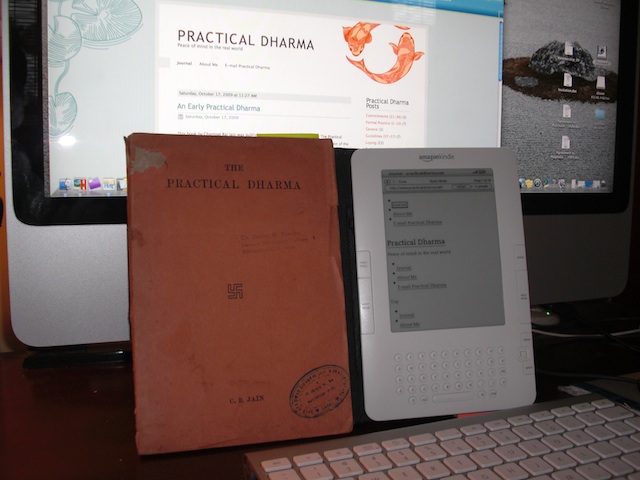no matter how fortunate a person's environment may be.
I have been thinking about the question I posed (to myself!) in a recent post. My question was, "why aren't more people enlightened?" From my observations of the state of the world, it appears not many are; even though we have millions of people in the West, who live in what would have to be considered a "high birth". These people live a life in which all of their material needs are met in abundance. In addition, there are tons of great resources out there to provide excellent insight into the dharma. If you are reading this you have probably seen lots of these. For example, go to Daily Buddhism, you can see the information is always spot on. Yet from the questions asked on that site, it is clear many people are still struggling.
It is plainly not about how fortunate one's circumstances appear to be. Is my situation more favorable because I have ten thousand times more than what I need? I think not; it is probably true that having many times more stuff than I actually need is a barrier to enlightenment. (Wow, how did I forget this!) I still argue that we have abundant affordances to make enlightenment available to many more people in the West than seem to be benefiting from these resources. These are the same things I mentioned in a previous post, such as access to education, the Internet, teachers, etc.
The answer to "why aren't more people enlightened" is that it takes a lot of meditation to create the circumstances that allow the dharma to fall on fertile ground.
Since I recognized the fundamental truth of the Four Noble Truths and other aspects of the Dharma, my life is mostly without suffering. Before I had moments of release from suffering, now I have moments of suffering interspersed with mostly time with peace of mind. Even for these moments of suffering, I typically wake up after only a few minutes to realize what I need to do to return to peace of mind.
My life was a natural experiment in the benefits of meditation. (I think there may be others who have a similar situation.) I first started meditating in 1972 using the Transcendental Meditation (TM) method. I have meditated regularly since that time, my practice has changed over time especially in the past 8 years as I developed more understanding of philosophical Buddhism. I did OK during the time I was "just" meditating, but not following the Buddhist dharma. I married, had great kids, got my PhD in psychology, worked as a therapist in many different settings, and I think helped many people.
Prior to about 2000, I had read Buddhist literature and spoken to Buddhist practitioners, but too often I encountered faulty information such as silly ideas about reincarnation, karma, deities, etc. But sometime around 2000, I found Stephen Batchelor's book Buddhism Without Beliefs (1997, ISBN 1-57322-656-4) It was then that I realized, there was a philosophical Buddhism that was true. At that time, I had been meditating for 28 years. You might say that insight fell on fertile ground.
I have only been studying the Buddhist Dharma with an open mind since 2000, so it seems to me that I got a rather immediate benefit from the first moment I "heard the Buddhadharma", but now that I think about my situation, I had been preparing my mind for 28 years prior to my first hearing with things like, a well developed meditation practice, continuous study of psychology, and compassion work "in the field". The past 8 years have been a time of rapid release from suffering. This has especially been true for me in the past 3 or so years during which I have had even more release from suffering and even a few moments of clarity ;)
If you are looking for peace of mind, you are doing the right thing to seek out the Buddhadarma, the community of Buddhist followers, and right minded teachers; and you will need to develop your meditation practice to cultivate fertile ground in which your peace can grow.
If you think others might like this article submit it to StumbleUpon by clicking Submit.

 Saturday, October 17, 2009
Saturday, October 17, 2009 
 attachment,
attachment,  practical dharma in
practical dharma in  General
General 
